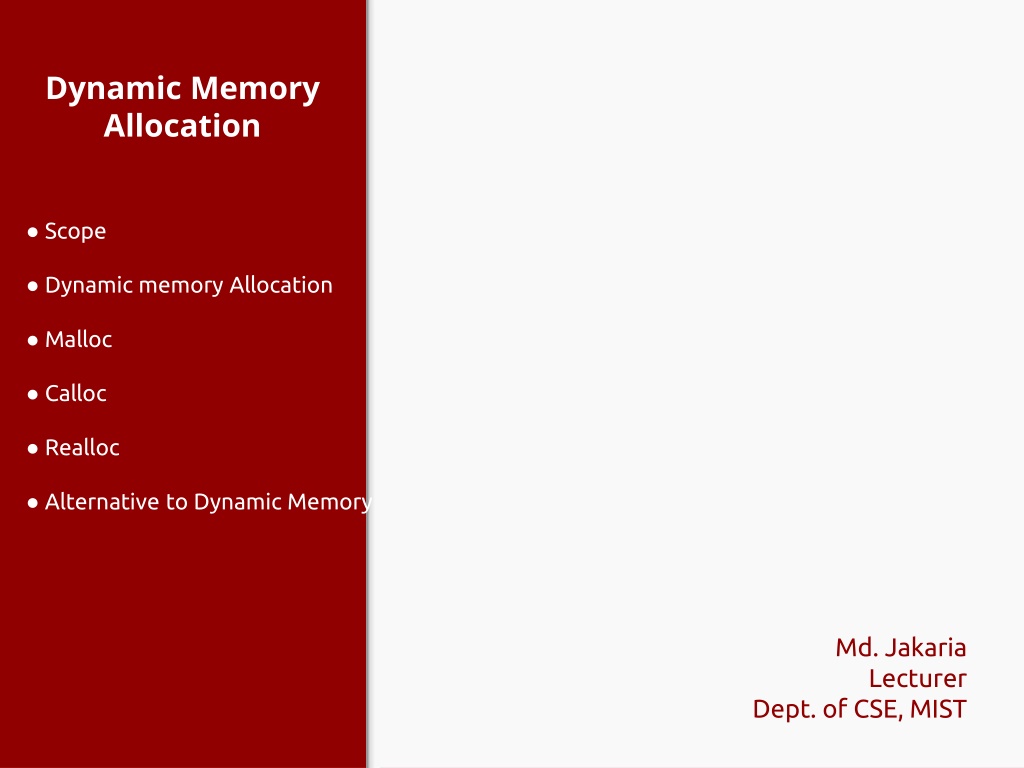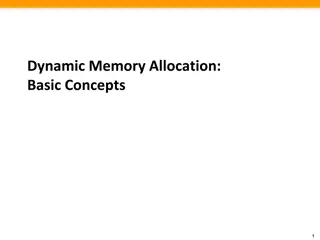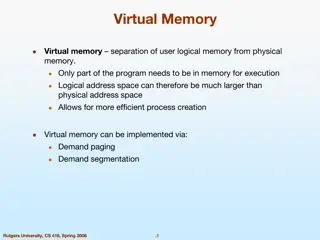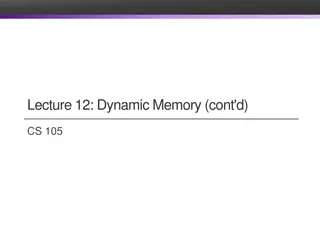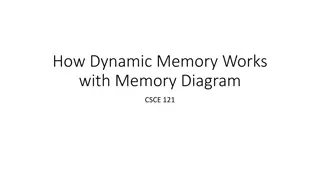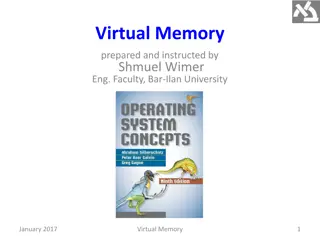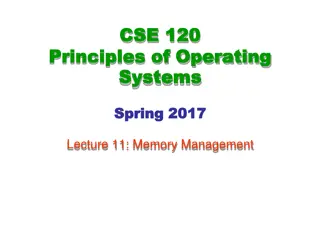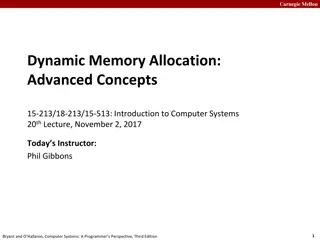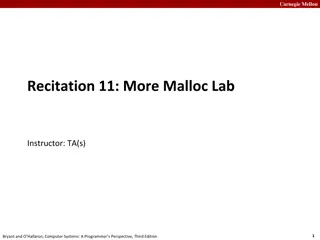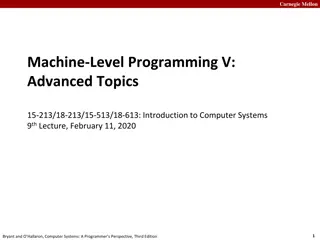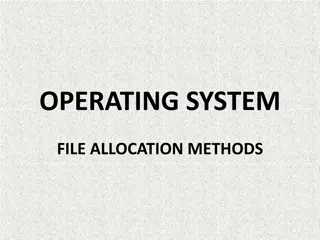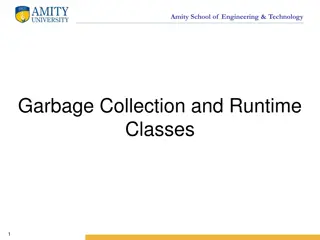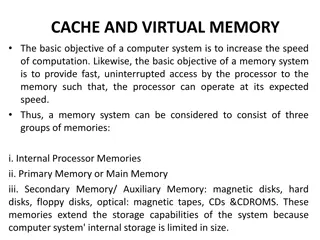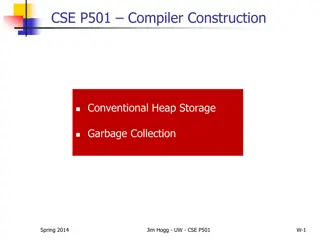Understanding Dynamic Memory Allocation and Variable Scope in Programming
This content delves into the concepts of dynamic memory allocation, variable scope, and the lifetime of local variables in programming. It explores the scopes of variables in different contexts and addresses issues like dangling pointers and out-of-scope references. The images provided visually enhance the understanding of these crucial programming concepts.
Download Presentation

Please find below an Image/Link to download the presentation.
The content on the website is provided AS IS for your information and personal use only. It may not be sold, licensed, or shared on other websites without obtaining consent from the author. Download presentation by click this link. If you encounter any issues during the download, it is possible that the publisher has removed the file from their server.
E N D
Presentation Transcript
Dynamic Memory Allocation Scope Dynamic memory Allocation Malloc Calloc Realloc Alternative to Dynamic Memory Md. Jakaria Lecturer Dept. of CSE, MIST
Scope of a Variable Three places
Scope of a Variable Scope of n and m
Scope of a Variable Scope of g
Lifetime of a local variable Local variables are destroyed when they go out-of-scope
Reference to Local Pointer referring to expired local variable
Reference to Local Pointer referring to expired local variable
Reference to Local Pointer referring to expired local variable (Dangling Pointer)
Reference to Local Pointer referring to expired local variable (Dangling Pointer)
Dynamic Memory Allocation The concept Out-of-Scope
Dynamic Memory Allocation The concept Out-of-Scope
Dynamic Memory Allocation The concept Out-of-Scope Out-of-Scope
Dynamic Memory Allocation The concept Out-of-Scope Out-of-Scope
Dynamic Memory Allocation The concept Out-of-Scope Out-of-Scope
Dynamic Memory Allocation The concept Out-of-Scope Out-of-Scope
Dynamic Memory Allocation The concept Out-of-Scope Out-of-Scope
The malloc function void * malloc (size_t size); Memory required in byte e.g. sizeof (int) Returns pointer to the beginning of the block According to the 1999 ISO C standard (C99), size_t is an unsigned integer type of at least 16 bit. This type is used to represent the size of an object. https://en.wikipedia.org/wiki/C_data_types#stddef.h https://stackoverflow.com/questions/2550774/what-is-size-t-in-c
Usage of malloc function Dynamic allocation of Array Struct Factory Methods
Destruction of Dynamic Memory When is it destroyed? Out-of-Scope Not destroyed automatically (Memory leak)
The free function When the outside (dynamic) memory is no longer needed void free(void *ptr)
The free function When the outside (dynamic) memory is no longer needed void free(void *ptr) free( )
The calloc function Same as malloc void *calloc(size_t nitems, size_t size) How many items? Size of each item The following two lines produces similar allocation
The calloc function void *calloc(size_t nitems, size_t size) Initializes every bit to zero Slower than malloc
The realloc function For resizing existing dynamic memory void *realloc(void *ptr, size_t size) Existing pointer New size Either memory is extended, Or Previous items are copied to new larger location
The realloc function void *realloc(void *ptr, size_t size) Existing pointer New size
The realloc function void *realloc(void *ptr, size_t size) Existing pointer New size
The realloc function void *realloc(void *ptr, size_t size) Existing pointer New size
The realloc function void *realloc(void *ptr, size_t size) Existing pointer New size
The realloc function void *realloc(void *ptr, size_t size) Existing pointer New size
Alternative to Dynamic memory - Global variables (Scope is increased) - Static variables (Life-time is increased)
Global Variable Initialization Automatically initialized
Global Variable Initialization Automatically initialized Credit: https://www.tutorialspoint.com/cplusplus/cpp_variable_scope.htm
Variable Shadowing In case of same name, local variable takes preference
The static Keyword Prevents local variable from being destroyed until the program terminates
The static Keyword Prevents local variable from being destroyed until the program terminates
Memory Layout of a C Program https://www.hackerearth.com/practice/notes/memory-layout-of-c-program/
Task 1 Create a resizable array of integers with the following options 1. Add a new number to the array 2. Display all numbers in the array 3. Delete an existing integer (by index) The storage should be flexible so that no memory is wasted.
Task 2 Task 2 Design a record book that will hold the name, id and total marks of a student. The following options should be available. 1. Add a new record 2. Display all records 3. Edit an existing record 4. Delete an existing record 5. Search for a record by name or id The storage should be flexible so that no memory is wasted.
Task 3 Task 3 Integrate Persistent storage (File) in Task 2, i.e. all the contents of the array should be written to file at the end of the program, and it should load all the contents from the file at the beginning of the program.
